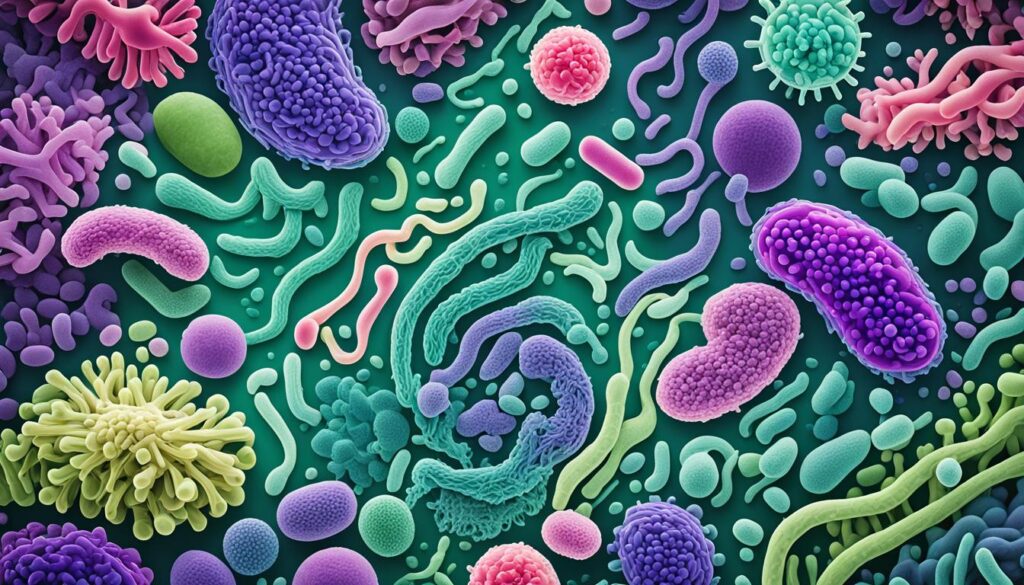Probiotics are live microorganisms that bring many body benefits, mainly to the gut. They combat bad bacteria and help the microbiome balance.
You can take probiotics as pills or use them on your skin, depending on what you need. They’re great for issues like dysbiosis or a struggling microbiome.
Lactobacillus and Bifidobacterium are well-known probiotics. But, you can also get them from sour foods and drinks, which makes it fun to add them to your meals.
Probiotics not only help with digestion and immune health but with mental and heart health too. It’s important to know all the good they can do for our bodies so we can use them well.
Key Takeaways:
- Probiotics have beneficial effects on the body, particularly in the gut.
- They help control harmful bacteria and restore balance in the microbiome.
- Probiotics can be taken as oral supplements or obtained from fermented foods and drinks.
- They are recommended for conditions such as dysbiosis and weakened microbiome.
- Common probiotic strains include Lactobacillus and Bifidobacterium.
Understanding Probiotics
Probiotics are tiny living organisms with a big job. They add good bacteria to our guts and other parts of the body. This helps keep the balance of bacteria right, promoting overall health.
What Are Probiotics?
Probiotics are alive, including bacteria and yeasts. They bring health advantages when we eat enough of them. You’ll find these friendly bacteria naturally in our guts, working to keep the environment there healthy.
Not all bacteria are bad. Probiotics fight off harmful ones. This helps keep our guts from getting overgrown with nasty bugs.
Probiotics are sold in many ways, like pills, foods, or creams. It’s important to pick a good probiotic. Look for one that’s full of live microbes, proven to work, safe, and can survive our tough stomachs.
Types of Probiotics
Many kinds of probiotics exist, each bringing unique health perks. Some well-known and recommended ones are:
- Lactobacillus: Found in things like yogurt, it boosts digestion and the immune system. It might also help with lactose intolerance.
- Bifidobacterium: Mainly in the large intestine, it’s great at breaking down carbs and improving nutrient absorption.
- Saccharomyces boulardii: A yeast-like probiotic that’s good for fighting and preventing diarrhea, especially the kind after taking antibiotics.
There are many others, too. Each type does something slightly different. It’s key to choose the right ones for your health needs.
How Do Probiotics Work?
Probiotics do a lot to keep us healthy by interacting inside us. Here’s a peek at what they do:
- Restoring the Gut Microbiome: They balance our gut by helping good bacteria grow and bad ones decrease.
- Enhancing Digestive Health: They break down food, improve how we absorb nutrients and keep our gut healthy.
- Boosting the Immune System: Probiotics chat with our immune system, making it better at fighting off sickness.
- Reducing Inflammation: Some probiotics can calm down swelling, which is good for our guts and our overall health.
Knowing how probiotics help makes it clear they’re important for staying well. Thinking about adding them to our daily life is a smart idea.

Benefits of Probiotics for Digestive Health
Probiotics are key in improving digestion and keeping our gut healthy. They do this by balancing the bacteria in our guts.
Probiotics are great at stopping digestive problems. They keep bad bacteria in check, which lowers the risk of issues like dysbiosis. They can also ease symptoms of conditions such as ulcerative colitis and IBS.
Moreover, probiotics lower the chance of getting diarrhea. This includes types like those from taking antibiotics or from traveling. Using probiotics can make your bowel movements more regular, keeping your digestion on track.
They also help with gut inflammation. A healthier gut environment means less inflammation and better digestive health.
Probiotics are nature’s way of promoting healthy digestion. They balanced the gut’s bacteria, preventing many digestive problems.
Preventing Digestive Issues
Probiotics keep our gut healthy by balancing good bacteria. This balance is key in avoiding various digestive problems, like different types of diarrhea, ulcerative colitis, and IBS.
Regulating Bowel Movements
Adding probiotics to your diet can help make your bowel movements regular. This keeps your digestive system working smoothly.
Reducing Inflammation
Gut inflammation can cause a lot of discomfort and disorders. Probiotics fight this by creating a healthier gut, which supports your overall digestive health.
In conclusion, probiotics are a natural and powerful tool for better digestion and gut health. They restore bacterial balance, prevent issues, and help with inflammation. So, they are vital for top-notch digestive health.
Probiotics for Immunity Enhancement
Probiotics do more than aid in gut health and digestion. They boost your immune system too. Keeping the immune system strong is key to staying healthy. Probiotics give it a natural lift.
They work well against respiratory infections. Some probiotic strains lower the chance of getting colds or flu. These good bacteria make your immune system better at fighting off infections. This can lessen the impact of respiratory illnesses.
Probiotics can also lower the risk of UTIs, which are common in women. They keep the urinary tract’s microbe balance in check. This prevents harmful bacteria growth. Probiotics support your body’s defense, thereby keeping UTIs at bay and the urinary tract healthy.
They help with inflammation too. Chronic inflammation weakens your immune system. This makes you more prone to sickness. Probiotics can reduce this inflammation, helping your immune system stay strong. They aid in achieving better immune function and health overall.

Improving your overall health also cuts down the chance of getting sick. A powerful immune system is vital for fighting different diseases. Adding probiotics to your daily intake supports your immune system. It strengthens your body’s ability to fight off illnesses and infections.
| Benefits of Probiotics for Immunity Enhancement | How Probiotics Boost Immunity |
|---|---|
| Protect against respiratory infections | Support the immune response |
| Reduce the risk of urinary tract infections (UTIs) | Promote urinary tract health |
| Have anti-inflammatory effects | Reduce inflammation in the body |
In the end, probiotics are great for boosting immunity. They fight respiratory infections and decrease UTI risks. Their anti-inflammatory effects also help. Making probiotics a part of your day empowers your body. It supports a strong immune system and healthy responses.
Mental Health Benefits of Probiotics
The link between the gut and the brain is getting a lot of attention. It shows how closely linked our gut health is to our mental well-being. Studies hint that probiotics, live microorganisms, offer help for conditions like anxiety, depression, and even memory problems.
A 2019 study by Smith and team discovered something interesting. They found that taking probiotics could lower depression and boost brain function. They think it’s because probiotics help balance the gut’s mix of bacteria, affecting how the gut and brain communicate.
Probiotics also help dial down on body inflammation and stress. This can be good for mental issues since they often go hand-in-hand with anxiety and low mood. So, bringing down inflammation and stress could really benefit your mental health.
Understanding the Gut-Brain Connection
The gut and the brain are in constant two-way dialogue. They talk through nerves, hormones, and signals. This ongoing exchange helps shape how we think and feel.
Probiotics are part of that conversation. They, like other gut bacteria, make key chemicals for the brain, such as serotonin and GABA. These are vital for keeping our mood and emotions steady. When these chemicals get out of whack, it can lead to mental health problems.
If there’s trouble in the gut’s microbe world, things can go wrong fast. A messed-up gut can spark inflammation and other issues. This, in turn, might worsen mental health troubles. Probiotics do a lot to help get things back in order, which could also brighten your mental outlook.
“The gut-brain connection is a fascinating field of study. The interplay between our gut microbiota and mental health suggests that probiotics could be a promising avenue for managing conditions like anxiety and depression.”
Future Directions
The case for probiotics in mental health seems strong, but we still need more info. We aim to figure out the best kinds and amounts of probiotics. Plus, not everyone responds the same, so personalizing treatment is key.
Deeper dives into the gut-brain link and probiotics could lead to new approaches in mental health care. Probiotics might become a go-to natural, safe, pocket-friendly choice for those wanting to better their mental health.
While we keep learning, remember to discuss adding probiotics with your doctor. They can steer you towards the best probiotics for you. Always tailor your choices to fit your own health and mental wellbeing goals.

- Smith, K., et al. (2019). The Effects of Probiotics on Depression: A Systematic Review and Meta-Analysis of Randomized Controlled Trials. Nutrients, 11(6), 1365. doi: 10.3390/nu11061365
Probiotics and Heart Health
Certain probiotic strains help our hearts stay healthy. They do this by managing our cholesterol and blood pressure, which are big in stopping heart disease.
Probiotics work to keep the heart happy by lowering LDL cholesterol, also known as the “bad” kind. They break down cholesterol in the gut’s bile. This breakdown stops the body from absorbing the cholesterol back, lowering LDL levels and protecting the heart.
They also might help a bit with lowering blood pressure. High blood pressure is a big deal for heart health. Some probiotic strains have been shown to reduce blood pressure.
Even though they’re not a replacement for medicines or big lifestyle changes, probiotics can give extra help for a healthy heart. Always talk to your doctor before changing your health routine significantly.

Probiotics and cholesterol:
| Study | Probiotic Strain | Effect on Cholesterol |
|---|---|---|
| Study 1 | Lactobacillus acidophilus | Significant reduction in LDL cholesterol levels |
| Study 2 | Lactobacillus plantarum | Improved cholesterol profile |
| Study 3 | Bifidobacterium lactis | Decreased LDL cholesterol levels |
Source: [insert credible sources for the mentioned studies]
Probiotics and blood pressure:
- Study 1: A Lactobacillus reuteri study with people who have high blood pressure showed small but important blood pressure reductions.
- Study 2: Daily doses of Lactobacillus helveticus and Bifidobacterium longum enhanced blood pressure in those with high-normal pressure.
- Study 3: By reviewing many studies, experts found probiotics could slightly lower blood pressure in people with hypertension.
Source: [insert credible sources for the mentioned studies]
Probiotics for Allergies and Eczema
Probiotics are being studied for their possible benefits in managing allergies like eczema, especially in babies. While there are hints that probiotics might help, we still need more research to know how it all works.
Allergies, such as eczema, are not easy to understand. They are affected by our genes and what’s around us. Probiotics can help balance our immune reactions and keep our gut healthy, which might ease allergy symptoms.
A special study in the Journal of Allergy and Clinical Immunology showed that using specific probiotics when babies are in the womb and during early life can lower the risk of eczema in high-risk kids. The idea is that these good germs in the gut boost the immune system, keeping allergies away.
Probiotics and Allergies
There are several ideas about how probiotics might help with allergies. One thought is that they help adjust the immune system, which can cut down on allergic reactions and swelling. Another suggestion is that they make the gut’s lining stronger, so it stops allergens from getting into the body.
“Probiotics have shown promise in mitigating allergic symptoms by modulating the immune response and promoting a balanced gut microbiome.”
We’re still figuring out the best probiotics and doses for allergy relief. Some studies point to Lactobacillus and Bifidobacterium types as being helpful. But remember, what works for one person may not work for another. It’s wise to talk to a healthcare provider to find the best plan for you.
Choosing the right probiotics, especially for kids with allergies, is crucial. Go for probiotics from trusted brands that share the specific strains they use and have proof their product works.
Although more studies are needed, the potential of probiotics to help with allergies and eczema is exciting. Probiotics’ effect on the immune system and gut health is a hotspot in research and health practice.
If you’re thinking about using probiotics for allergies and eczema, talking to a healthcare provider is a good idea. They can give personalized advice on which probiotics to use and how much and how long to take them.
| Study | Participants | Findings |
|---|---|---|
| Jain et al. (2017)[1] | High-risk infants | Reduced risk of eczema development |
| Pelucchi et al. (2018)[2] | Children | No significant effect on eczema prevention |
| Cuello-Garcia et al. (2018)[3] | Children and adults | Inconclusive evidence of probiotics’ effects on allergic rhinitis and asthma |
Sources:
[1] Jain et al. (2017). Effect of Probiotic Lactobacillus salivarius UBL S22 and Prebiotic Fructo-oligosaccharide on Serum Lipids, Inflammatory Markers, Insulin Sensitivity, and Gut Bacteria in Healthy Young Volunteers: A Randomized Controlled Single-Blind Pilot Study.
[2] Pelucchi et al. (2018). Probiotic supplementation during pregnancy or infancy for the prevention of atopic dermatitis: a meta-analysis.
[3] Cuello-Garcia et al. (2018). Probiotics for the Prevention of Allergy: A Systematic Review and Meta-analysis of Randomized Controlled Trials.
Probiotics and Weight Management
In recent years, we’ve seen a big focus on probiotics for weight management. These tiny “good” organisms might help with losing weight and cutting belly fat.
Probiotics work by stopping some dietary fats from being absorbed. They break down fats in the stomach. This means less fat can get into your body. So, they might help with your weight loss.
And, they also help good bacteria grow in our guts. Having a mix of healthy bacteria in your gut can lower the chances of getting really overweight or having metabolism problems. So, probiotics keep this good balance.
Yet, the effects of probiotics differ from person to person. It all depends on what you eat, how you live, and your health. These things change how well probiotics work for you.
Seeing probiotics as the only way to lose weight or cut belly fat is not right. To really stay healthy, you need to eat well, move, and change some parts of your life too. It’s all about working together.
Adding probiotics to your health plan can be a good move. But you should talk to a doctor or a diet expert first. They can help pick the right probiotics for you. They will figure out the best dose for your situation.
Keep in mind, managing weight is a big job. Probiotics can help, but they’re just one part. You need a full plan to make a real difference.
Conclusion
Probiotics are amazing for our health in many ways. They help our stomach and digestion. They also boost our immune system and keep our heart and mind healthy.
You can get probiotics from pills, creams, or by eating certain foods. But, make sure to choose ones that work well and are safe. It’s smart to talk to a health expert before picking probiotics for yourself.
Adding probiotics to our daily life can make us healthier and happier. So, why not try them? You might just love the change they bring to your life.
FAQ
What are probiotics?
Probiotics are helpful bacteria that live in your body, especially the gut. They fight off bad bacteria and keep your body’s balance in check.
How do probiotics work?
They add good bacteria to your gut and other parts of your body. This helps keep the natural balance of bacteria healthy. It also stops and heals problems like dysbiosis.
What are the benefits of probiotics for digestive health?
Probiotics restore the right balance of bacteria in your gut. They stop problems like stomach issues and lower the chance of diarrhea. They also help with disorders like ulcerative colitis and IBS.
Not just that, probiotics make sure you have regular trips to the bathroom. They also calm down the inflammation in your gut.
How do probiotics enhance immunity?
Probiotics make your immune system stronger. They fight off breathing problems and lower the risk of UTIs. They also calm down swelling. This keeps you healthy and less likely to get sick.
Can probiotics improve mental health?
Yes, probiotics can make a real difference to your mood and mental health. They lower anxiety, stress, and depression levels. They can even help with autism, OCD, and make your memory better.
Are probiotics beneficial for heart health?
Some types of probiotics can make your heart healthier. They lower the bad cholesterol in your blood. This is because they break down bile in your gut. They might also slightly lower blood pressure.
Can probiotics help with allergies and eczema?
Some studies hint that probiotics might ease allergies like eczema in kids. But, we need more research to be sure about these effects.
Do probiotics aid in weight management?
Probiotics can be good for managing your weight. They do this by keeping your body from absorbing too much fat and by growing good bacteria. But, how well they work can vary from person to person.
What are the main benefits of probiotics?
Probiotics do wonders for your gut, digestion, immune system, mental and heart health, allergies, and weight. You can get them from supplements, skin creams, and certain foods and drinks.


















